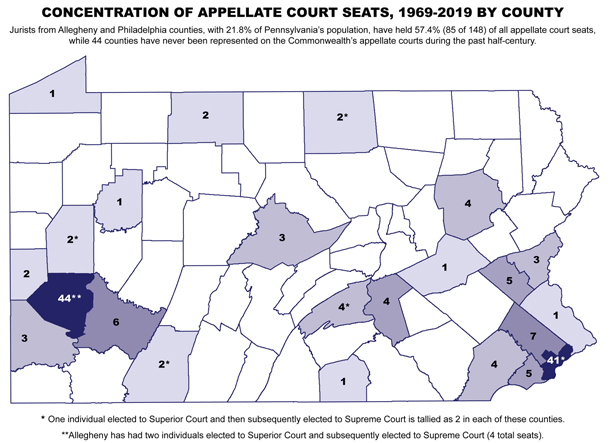
Regional Appellate Court Elections: Good for PA
January 6, 2020
In December, the Pennsylvania House of Representatives passed House Bill 196, a constitutional amendment to change the way we elect appellate court jurists in the state. Under this plan, instead of electing these jurists in statewide elections, they would be elected from regional districts. There would be seven Supreme Court districts, fifteen Superior Court districts, and nine Commonwealth Court districts. Members of these courts would be required to reside in the district they are elected from.
I offered this legislation to correct a glaring lack of regional diversity on Pennsylvania's appellate courts. Over the last 50 years, these courts have been utterly dominated by jurists elected from just two of Pennsylvania's counties. Despite containing just 21.8 percent of the state's population, Philadelphia and Allegheny counties have provided 57.4 percent of the jurists on these courts since 1969. Four of seven of our current Supreme Court Justices were elected from these two counties, as well as nearly 60 percent of all Superior Court judges in the last half-century.

When we create statutory law in the General Assembly, Pennsylvania's regional diversity plays a major role in shaping the compromises and consensus required to get a bill across the finish line. The practical application of those statutes most often occurs in Common Pleas court before judges who are elected by countywide regions. When those same statutes are considered on appeal and legal precedent is being shaped for the future, Pennsylvania's full diversity of legal and judicial theory should come to bear. That diversity is subverted when two counties so dominate our appellate courts.
The very nature of statewide judicial elections contributes to the unfair imbalance Pennsylvania has experienced over the last 50 years. Regional appellate court elections will increase the chances that voters will be more familiar with judicial candidates on the ballot, rather than casting their vote for unknown candidates from far-flung regions of the state. I believe a qualified judicial candidate from Lebanon County should have an equal and fair chance to serve on our appellate courts. Since 1969, no one from Lebanon County has been elected to any of these seats.
There are some who oppose my plan because they favor a "merit selection" system over electing judges. It should be known that both my plan for regional appellate court elections, and a "merit selection" appointive plan, were considered by the House. In the end, only the regional election plan received enough support to be approved and sent to the Senate.
Pennsylvania once had a "merit selection" appointive system, but it was replaced by elections in the 1870's because it was riddled with corruption and cronyism. Ironically, a recent interim appointment to Commonwealth Court by Governor Wolf and confirmed by the Senate was derided by Pennsylvanians for Modern Courts, the leading advocacy group of an appointive system under the guise of "merit selection."
Let's be clear: Politics will never be absent from any system of selecting judges. With elections, those politics are at least out in the open for all to see if they wish to look. In a system with appointments by "merit selection," those politics will be buried beneath a shroud of political appointees and politically-connected special interests who control the appointive body.
Ultimately the law belongs to Pennsylvania's 12.8 million citizens, not politicians or political appointees. As such, the people of this state deserve to retain their right to elect the judges who apply that law on appeal and set legal precedent for the future.
Finally, as a constitutional amendment, the regional appellate court election system embodied by House Bill 196 will need to pass the General Assembly in two consecutive sessions and then be ratified at the ballot box by Pennsylvania's voters. Lebanon County voters deserve the opportunity not only to decide this question, but also to have their regional interests fairly represented on Pennsylvania's most important courts.






